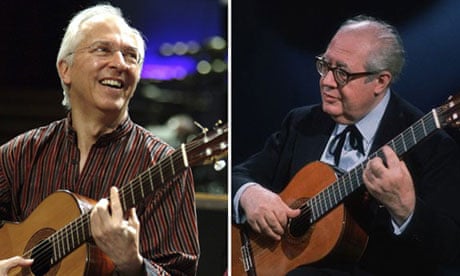Andrés Segovia is revered as one of the greatest guitarists of the 20th century. But, 25 years after his death, his reputation is being challenged by one of his former students, the guitar virtuoso John Williams, who has attacked him as a musical and social snob who stifled creativity among his students.
Williams, an Australian who lives in the UK, studied with the Spanish maestro in the 1950s and believes that Segovia looked down on music without the right classical provenance and bullied young musicians with teaching methods that were unsympathetic and unhelpful.
His disparaging comments are to be published this month in a new biography, entitled Strings Attached: The Life and Music of John Williams. The author, William Starling, a friend, has had Williams's full co-operation.
Starling told the Observer that Williams was "famously private", resisting the very notion of a biography until now: "His family and friends were amazed when he agreed to do it."
He added that, despite being a pupil of Segovia, "he is very outspoken about [him] and the way Segovia is hailed as being the most important person in modern guitar".
Starling reveals that Williams remembers Segovia making his students copy his every inflection – demands that he believes "undermined any sense of personal ownership of a piece".
The biographer adds: "It was as if Segovia had… ordained that there was but one valid transcription, one interpretation and one fingering of anything in the repertoire and they were his own. John feels that, perhaps because of this, he never played his best for Segovia and that many of the maestro's students would have been better if they were not so constrained."
Segovia is credited as the father of the classical guitar, having widened the repertoire, transcribing works originally for lute and harpsichord and breathing new life into the instrument. Williams studied under him at the Accademia Musicale Chigiana in Siena, and is regarded as one of the foremost musicians of his generation, a master of the classical repertoire who brought the guitar to a wider audience with the group Sky and through collaborations involving the music of South America, Africa and jazz.
Williams, whose recordings include Cavatina, a worldwide hit after it became the theme tune to the Oscar-winning film The Deer Hunter, reveals through the biography that, on a visit to London in 1977, Segovia heard him play Cavatina. The Spaniard commented that it was "a very pretty tune" and asked who wrote it, declining to add further praise or comment when told that it was Stanley Myers. Starling writes: "This is a perfect illustration of what John Williams characterises as the musical conservatism and snobbishness of Segovia. He liked the piece but was reluctant to give it credit because it did not have the right classical provenance."
Segovia's snobbishness, Williams told Starling, included a dislike for South American music, especially that with popular roots.
Williams struggles to understand why the Spaniard was dismissive of the Venezuelan guitarist Antonio Lauro and why he banned the Paraguayan Agustín Barrios from his classes. He also claims, through the biographer, that Segovia "sought to conceal his background" and "spun an image that he was from a cultured class. Segovia's desire for status was finally sated when he was ennobled in 1981 by King Juan Carlos."
Graham Wade, classical guitarist and author of books on Segovia, defended the Spaniard, describing Williams's criticisms as unfair: "Segovia's pupils all played very differently. Segovia's guitar was always absolutely lyrical. He saw the guitar as a melodic instrument… John is perhaps the most technically accomplished guitarist the world has seen… A worthy successor to Segovia."
EMI Classics, whose recordings include Segovia's performances, declined to comment.

Comments (…)
Sign in or create your Guardian account to join the discussion